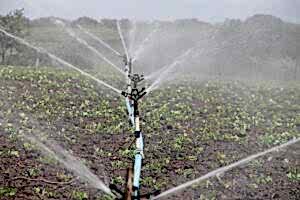 An irrigation system is a network of components delivering water to needy areas. Components can include pumps, valves, sprinklers, and pipes. An efficient system ensures plants receive the right amount of water for optimal growth.
An irrigation system is a network of components delivering water to needy areas. Components can include pumps, valves, sprinklers, and pipes. An efficient system ensures plants receive the right amount of water for optimal growth.
The key to operating and maintaining an irrigation system efficiently is being aware of its components. If you’re a beginner, you must know the essential elements of this system and understand the basic maintenance techniques.
Here are some tips to help you get started:
Tip #1: Assess Your Irrigation System
The first step in operating and maintaining your irrigation is to assess the layout of your components. This is key to identifying any problems or needs for maintenance. You’ll most likely need to hire a professional for this task.
If not, you can do a basic assessment yourself. Check for any visible signs of damage or corrosion, such as broken pipes and leaking valves. Also, inspect the sprinkler heads and nozzles to make sure they’re functioning correctly.
Tip #2: Make Sure You Have a Proper Water Supply
Another critical factor in operating and maintaining an irrigation system is having a reliable water source. Make sure your system is connected to an adequate water supply and that it’s in good condition. You’ll also want to ensure the pressure of your water supply is suitable for its components.
There are various methods for determining the size and capacity of your water supply. You’ll want to consult with a professional if you’re unsure about this step. But, a basic understanding of your water supply will prove beneficial in any case and is essential for properly operating and maintaining your irrigation system.
Tip #3: Monitor Water Usage
Monitoring your water usage will help you determine if there are any problems with your irrigation. If you use an automated sprinkler system, set the timer to water during cooler times of the day, such as early morning or evening. Additionally, make sure all components are in working order and that there are no leaks affecting your overall water usage.
Careful monitoring can help you recognize any issues with your system and make the necessary adjustments.
Tip #4: Schedule Regular Maintenance
Regular maintenance will keep your irrigation system running smoothly and prevent costly repairs in the future. Aim to inspect all components at least once a year, or whenever you notice anything out of the ordinary.
You should also check for any clogs or obstructions in the pipes and sprinkler heads, as this can cause water pressure to drop. If you notice anything out of the ordinary, contact a professional lawn care crew like Heroes Lawn Care for your irrigation system needs. These professionals should be able to identify any issues and take the necessary steps to repair them.
Tip #5: Invest in Quality Products
Investing in quality products is the best way to ensure your system lasts for many years. Make sure to purchase components from a trusted manufacturer that offers warranties or guarantees on their products. This will help you avoid any costly repairs and replacements due to poor quality parts.
Here’s an overview of what to look for when shopping for its components:
- Durability: Make sure the material used is designed to resist corrosion, rust and extreme weather.
- Quality Control: Check to see if the manufacturer has any certifications that guarantee quality control for their products.
- Ease of Installation: Look for components that are easy to install and require minimal maintenance.
- Warranty: Look for warranties or guarantees that cover any potential damages or breakdowns.
Tip #6: Adjust the Irrigation Settings
Your irrigation system should be set up in a way that helps conserve water. This includes adjusting your timer according to local climate and weather conditions as well as selecting an appropriate watering cycle for your lawn’s specific needs.
You should also consider making some changes to your irrigation settings during certain times of the year. For example, you may want to reduce the watering time or frequency during the winter months when your lawn doesn’t need as much water.
We hope these tips will help you get started with creating an efficient irrigation system for your home or business. Remember, it’s important to consider all of the factors that go into designing an effective system, such as the local climate, soil type and water availability.
By following these tips, you can ensure that your system is running effectively and efficiently, helping you save money and conserve resources. With regular maintenance and some tweaks to your settings, rest assured you can keep your lawn looking its best. As a local homeowner, it is our responsibility to ensure that we are using our resources as efficiently and responsibly as possible.
Don’t forget to share your thoughts with us below in the comments. We look forward to hearing from you!